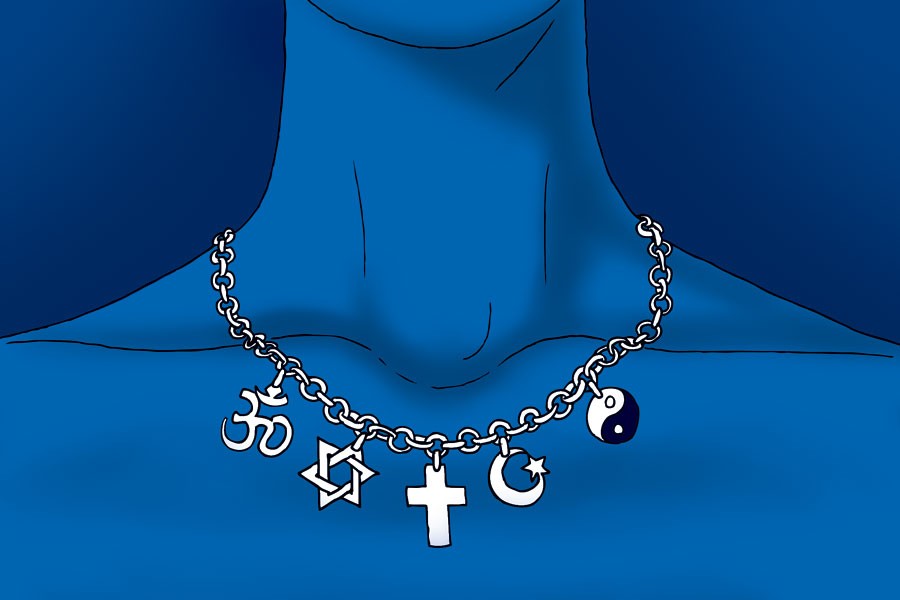‘All I see is Christian’
Students seek melting pot, see unequal representation
President Linda Bennett announced at the beginning of the semester that the university will focus on the concept of “civility.” Bennett said this focus promotes healthy discussion despite critical differences in opinion, beliefs and culture. This week, The Shield explored religious civility on campus and asked students of varying faiths to reflect on the university atmosphere.
A USI student often has to lock herself in her room.
The sophomore identifies as spiritual, but doesn’t adhere to one religion. Her way of life contrasts from that of her religious suitemates.
She said oftentimes she’s treated so poorly she has to separate herself from the people she lives with.
While the university pushes for civility on campus this semester, the sophomore said she doesn’t know many people willing to have healthy conversations with her about religion.
“In college, I expected to be able to have civil conversations with people,” the sophomore said. “I feel like I have to hide how I feel.”
She chose to remain anonymous for her safety.
The number of students who don’t identify with one religion has increased since 1971.
According to a study by the University of California, 28 percent of the class of 2018 said they don’t identify with any particular faith. The percentage indicates an all-time low in religious affiliation in the history of the study.
Although more students in the nation are identifying with the sophomore’s beliefs, she said people at USI have a hard time accepting her worldviews.
The sophomore said she has a discussion-heavy communications class in which she feels personally attacked for her beliefs.
“Even when what they say doesn’t necessarily sound hateful, it shows in body language,” she said. “They sit there, look directly at me and say people without religion don’t go to heaven.”
The majority and the minority
Sophomore Hank Burgher is part of the majority. He said on a scale of 1 to 10, he’s about a 15 on his passion for Christianity.
However, Burgher doesn’t want to be spoken to as a Christian. Instead, he wants to be spoken to as a person.
As part of the most prevalent religion on college campuses, Burgher said his discussions about religion have all been civil. He has the most options in terms of joining organizations to meet students like him.
The only problem he identified on campus was others potentially changing conversation subjects when they learn of his faith.
“When someone is discussing a topic with me, they may backtrack and assume I’m not interested because I’m Christian,” Burgher said.
According to The Campus Religious and Spiritual Climate Survey released in 2015, 57 percent of college students identify with Burgher’s religion. The study refers to Christianity as the “worldview majority.”
Although the majority of campus seems Christian, Burgher said, the university has a fairly good environment for talking about all religions.
“I think people of other religions are accepted, but I don’t feel like they’re seen,” he said. “Part of me feels like the school should reach out to students of different beliefs, but I don’t know how they’d do that.”
Fifty-eight percent of the worldview majority surveyed said they were satisfied with worldview diversity at their universities. However, only 29 percent of minority religions said there was enough religious diversity on their campuses.
Endah Rosa is part of the religious minority and notices a lack of diversity in university organizations. As a Muslim, there are no religious student groups for her to join.
“There’s no community club,” she said. “It’s all Christian.”
The freshman international student said she has met quite a few Muslim students, but all have been fellow international students.
Rosa said within the primarily Christian population, students ask her a lot of questions about Islam. While Rosa is open to talking about religion, she said she feels like she can’t really express herself within Islam on campus.
“I was always taught America is a melting pot of diversity,” she said, “but all I see is Christian.”
Of the 11 student organizations offered by Religious Life, 10 are solely Christian organizations. The other is the Secular Student Alliance.
Choose your dish
Evansville Interfaith Alliance member Zac Parsons said he’s surprised college students like the anonymous sophomore still fear being judged for their beliefs.
“I feel like students, the millennials, are not scared to state their religion,” the former pastor said. “If they are, there must be something wrong with either the message they tell or the delivery of it.”
Parsons said anyone trying to discuss religion has to practice active listening rather than being combative and aggressive.
“You can’t try to convert everybody,” he said. “Who knows what the truth is? We need to come to the table open to being wrong.”
Religious Life Director Christine Hoehn said students need to respect beliefs that contradict what they believe.
“We can go to a restaurant and order all kinds of different dishes,” she said. “I might not like what you order, but you have the right to eat it.”
She said for most who live on campus, college is the first time students aren’t under parental supervision.
Hoehn said the sudden exposure to different ideas at a university opens up the mind, which is a process that can’t be undone.
She said if students feel uncomfortable sharing their opinions, her office wants to reach out to them.
“For the people who feel too scared, I’d say there are no gains without risks,” Hoehn said. “I would enjoy having a conversation with them to find reasons and help the broader community be more accepting. They too have a voice.”



